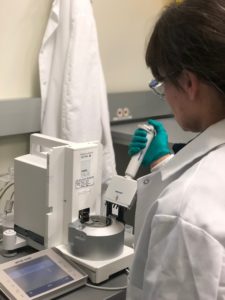Scientific investigation is an iterative process, for which reproducibility is key. Reproducibility, in turn, requires accuracy and precision—particularly in measurement. The unsung superheroes of accuracy and precision in the research lab are the members of your local Metrology Department. According to Promega Senior Metrologist, Keela Sniadach, it’s good when the metrology department remains unsung and behind the scenes because that means everything is working properly.
Holy Pipettes, Scientists! We have a metrology department?! Wait…what’s metrology again?
Metrology (the scientific study of measurement) got its start in France, when it was proposed that an international length standard be based on a natural source. It was from this start that the International System of Units (SI), the modern metric system of measurement, was born.
Metrology even has its own day: May 20, which is the anniversary of the day that the International Bureau of Weights and Measures (BIPM) was created by the Meter Convention in Paris in 1875. The job of BIPM is to ensure worldwide standards of measurement.
For life scientists, metrology centers around making sure the equipment used everyday—from pipettes to heating blocks to centrifuges—is calibrated and measuring correctly.
The metrologists and calibration technicians at Promega are responsible for calibrating the equipment used in every R&D, Production and QA lab at Promega. They calibrate pipettes, water baths, thermal cyclers, microplate readers—you name it. Their goal is to stop problems before they happen—to calibrate and “catch before fail”. Last year they calibrated 6,439 individual items at the Promega Madison campus.
Who are these Masked Metrologists?
The members of our metrology team at Promega come from a variety of backgrounds, and there is no one path into a career in metrology. Often metrologists have military experience and have received training and certification through their service. Some will come from a biotech background, and others have electronics training. Almost all have studied physics, mathematics or some other science. There are certifications and on-the-job training opportunities that give metrology scientists common experience and vocabulary as well.
Advice from Your Friendly Neighborhood Metrologist
So what advice do metrologists have for the bench scientist?
- One: If you are feeling uncomfortable with the way a piece of equipment is performing, get it checked out.
- Two: Clean your equipment and store it properly every day.
- Three: Subscribe to the @Promega YouTube channel for a series of videos about ways to ensure the best pipetting accuracy possible.
It’s measurin’ time!
To learn more about proper pipetting technique, reference the supplementary video below.
For further reading:
2019 The International System of Units (SI) NIST https://www.nist.gov/publications/international-system-units-si-2019-edition
Looking for a career in science? We have many options from research and development, to production, to quality assurance and more. See what opportunities await you at: https://bit.ly/3EEQqKF

